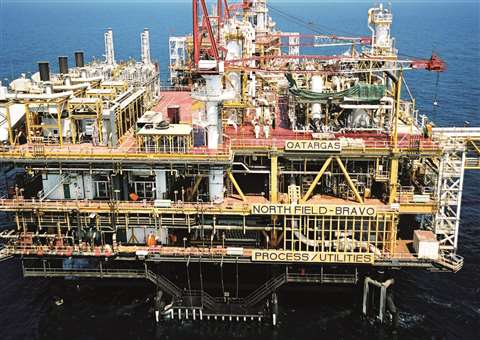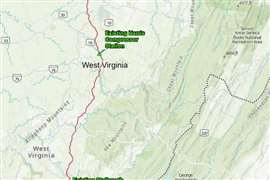Giant LNG ambitions in the Middle East
March 01, 2022
 A second phase of expansion of the North Field is then set to further increase the LNG capacity from Qatar to 126mn tonnes/year at an estimated total cost of $28.75bn. (Photo: Qatargas.)
A second phase of expansion of the North Field is then set to further increase the LNG capacity from Qatar to 126mn tonnes/year at an estimated total cost of $28.75bn. (Photo: Qatargas.)
Qatar dominates natural gas news from the Middle East as it develops the North Field East expansion, which is the world’s single largest LNG project
Natural gas news from the Middle East over the past year has been dominated by developments in Qatar. The country is already one of the world’s leading LNG exporters, though it has recently been edged out by Australia and also stands to be overtaken by the US as more liquefaction capacity comes online there in 2022. However, Qatar is taking steps to regain and extend its LNG dominance as it expands production from its North Field, its portion of the world’s largest non-associated natural gas field, which it shares with Iran.
In February 2021, state-owned Qatar Petroleum – which has since been renamed to QatarEnergy – announced a final investment decision (FID) on North Field East (NFE), the first phase of its North Field Expansion project. NFE is set to increase Qatar’s liquefaction capacity from 77mn tonnes per year (tpy) to 110mn tpy. A second phase of expansion, North Field South (NFS), is then set to further increase capacity to 126mn tpy at an estimated total cost of $28.75bn.
“QatarEnergy is pressing ahead with the development of the North Field Expansion project that will return it to the global LNG export top spot,” consultancy IGM Energy’s principal advisor, Ian Simm, told COMPRESSORtech2. “Under the leadership of Saad al-Kaabi, the company has proven to be a shrewd operator and holds a stacked hand in building out its gas production and liquefaction capacity,” he said.
Among other advantages, QatarEnergy benefits from having extremely deep pockets, to the point that it has delayed choosing equity partners for the project and took FID on NFE by itself. It is in the process of evaluating offers for participation in the project from international companies, but has previously indicated that it is not afraid to go it alone if necessary. Another advantage the company enjoys is its low cost of supply, with rising natural gas prices and demand putting it in an even stronger position.
“North Field’s enviable size and productivity provide economies of scale that mean Doha’s LNG will remain profitable at prices way below its competitors,” Simm said. He also sees QatarEnergy’s delays in bringing on equity partners in NFE as having worked to the company’s advantage, given how the global gas market has changed in the interim.
“It looks like QatarEnergy will finally announce its choice of equity partners by the end of Q2, but given the number of delays to date, it wouldn’t be a great surprise if this date were to move,” he said. “The delays have ended up working in Qatar’s favor and it will likely find itself in a far stronger negotiating position than it would have previously.”
Infrastructure
While construction moves forward at NFE, a major compression project is simultaneously underway aimed at maintaining the production profile of the original North Field. According to an Upstream report from November, the North Field Production Sustainability (NFPS) project will entail at least seven compression platforms tendered across four phases in the coming years.
QatarEnergy did not respond to a request for further details, but COMPRESSORtech2 understands that while the NFPS budget is not comparable to that for NFE, it could still reach a few billion dollars.
Together, NFE, NFPS and NFS call for massive infrastructure buildout and billions of dollars’ worth of contracts to be handed out. A number of these have already been announced, but there are more still to come, and various contractors are reported to be competing for the work.
“By my estimates there are perhaps another $7-8bn worth of contracts still to be handed out for NFE, including Package 4, which relates to sulphur-handling at North Field East,” Simm said. “However, I’d say the key contracts in terms of opening up the North Field expansion were the $13bn EPC deal awarded last year to a JV of Chiyoda and Technip Energies covering the construction of four LNG mega-trains and associated facilities, and the offshore EPCI work awarded to McDermott in January.”
Simm also cited QatarEnergy’s ongoing $19bn plans to acquire up to 100 LNG vessels, which he says will be vital to exporting all of the additional cargoes of LNG.
The mega-trains that will be built by Chiyoda and Technip will each have a capacity of 8mn tpy and will receive around 6 bcf/d (1.7 × 108 m3/d) of feed gas from NFE. The contract also includes a “large” carbon capture and storage (CCS) facility. According to the two companies’ statement from February 2021, the CCS facility is expected to result in roughly 25% lower greenhouse gas (GHG) emissions compared with similar LNG projects – though it does not specify on what basis a project would be considered similar.
(This report is a taken from a regional update published in the March 2022 edition of CompressorTech2.)
MAGAZINE
NEWSLETTER

CONNECT WITH THE TEAM








